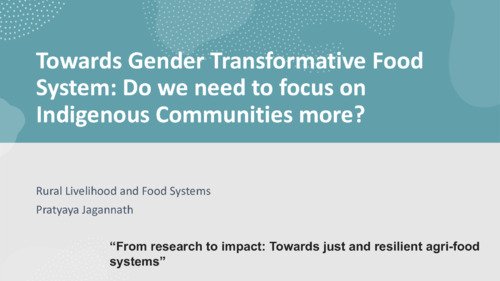Towards gender transformative food systems: do we need to focus on indigenous communities more?
Abstract
The literature on the food and nutrition security of tribal and/or indigenous communities in the mountain and hill regions remains opaque, despite the prevalence of malnutrition and food insecurity. Empirical evidence on the gendered dimensions of challenges in the agri-food system in the indigenous communities in the Hindu Kush Himalaya (HKH) region is even more limited. In this session, we focus on the need for gender-transformative approaches (GTA) in the HKH region, which extends over eight countries from Afghanistan in the west to Myanmar in the east. The panel session, chaired by Dr. Chubbamenla Jamir, Project Director, Climate Studies and Knowledge Solutions Centre, Government of Nagaland, India, is designed with following format: Part 1: Keynote paper Traditional food and nutrition security: Findings from Nagaland and Assam by Associate Professor Nazmun N. Ratna, Faculty of Agribusiness and Commerce, Lincoln University, New Zealand. Part 2: Research pitches on innovative methods for gender- transformative approaches: 1. Using storytelling as a tool for an inclusive and gendered approach to ensuring food security and sustaining livelihoods by Dr Grady Walker, University of Reading. 2. TBA: by Dr Chi Huyen Truong, ICIMOD. Part 3: Panel discussion on inclusive agri-food systems in the HKH region: • Dr Dolly Kikon, Associate Professor, University of Melbourne • Dr Sucharita Sen, Professor, Centre for the Study of Regional Development, Jawaharlal Nehru University • Ken Shimizu, FAO Country Representative for Nepal and Bhutan • Khet Khet Shein, Gender Analyst for UNDP Myanmar • CGIAR expert: TBA.

